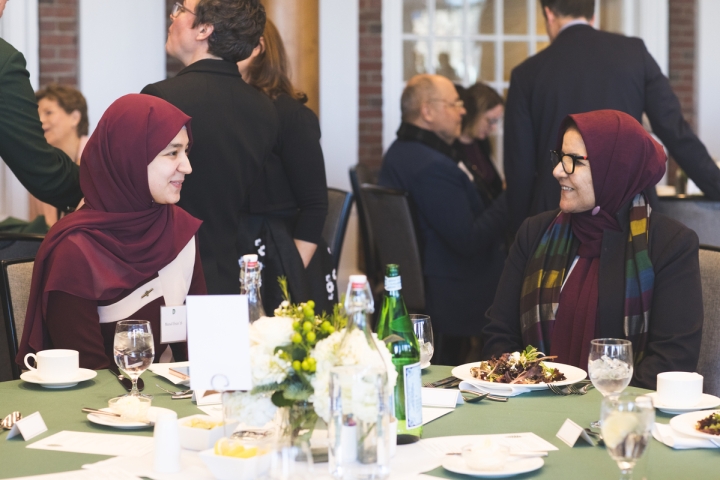Dartmouth on Thursday announced that two women judges forced to flee from Afghanistan after the Taliban returned to power are being appointed visiting scholars in public policy.
The announcement came during a luncheon at the Hanover Inn honoring judges Anisa Rasooli and Geeti Roeen, both of whom left Afghanistan with their families in 2021 after the fall of the Islamic Republic of Afghanistan.
The two women had earlier attended a welcoming ceremony in their honor at Hanover High School attended by U.S. Sen. Jeanne Shaheen, D-N.H., U.S. Rep. Becca Balint, D-Vt., and other state and local officials.
The events celebrated the women’s courage in upholding the rule of law in Afghanistan, often under threat of violence. Rasooli and Roeen and their families recently settled in Colchester, Vt., and Manchester, N.H., respectively.
President Sian Leah Beilock gave welcoming remarks at the luncheon, which also was attended by lawmakers, leaders of local nonprofits, and several Dartmouth students from Afghanistan.
Rasooli was the only woman to have been nominated to Afghanistan’s Supreme Court (the nomination was pending when the Taliban returned to power) and was known as the “RBG of Afghanistan,” a reference to the late Ruth Bader Ginsburg, several attendees said.
Roeen had been a legal consultant for the Afghanistan Women Education Center and served for 12 years as a court judge. She also participated in the International Association of Women Judges’ Rule of Law project.
Beilock expressed gratitude for the broad-based effort to bring the judges to the Upper Valley, including by judges in both New Hampshire and Vermont. New Hampshire Chief Justice Gordon MacDonald ’83 and Justice James Bassett ’78 were among those who participated in the Hanover High ceremony.
“At Dartmouth, we really have been modeling an idea that having different people with lived experiences at the table is the best way to get great outcomes,” Beilock said. “We’re so honored to be part of this endeavor.”

Rasooli and Roeen will be appointed as visiting scholars at the Nelson A. Rockefeller Center for Public Policy and the Social Sciences, Herschel Nachlis, associate director and senior policy fellow of the center, announced at the Hanover Inn event.
Nachlis said the gathering was an opportunity for both celebration and commitments.
Dartmouth and the Rockefeller Center are “celebrating our commitments to the rule of law and some of its central values,” such as judicial independence, the separation of powers, and equal protection, Nachlis said.
Other Dartmouth-related pledges include providing tangible support to the judges and “creating mentoring relationships with these new members of our community, to help welcome them with open arms,” he said.
The Rockefeller Center, Office of the Provost, and John Sloan Dickey Center for International Understanding will provide financial support for the visitorships and the judges’ engagements with the Dartmouth community, Nachlis said after the luncheon.
Through their affiliations with Dartmouth, the judges will meet with students, classes, faculty, staff, and the campus community to share their experiences and insights, Nachlis said. “We will work with local organizations expert in this work,” such as the Upper Valley nonprofit Supporting and Helping Asylees and Refugees, and the New Hampshire Supreme Court.
Mursal Ehsan ’26, who is from Afghanistan, also welcomed the judges in Farsi during the lunch.

In addition to honoring the judges and celebrating their accomplishments, the luncheon and morning ceremony embodied a call to action in support of women in Afghanistan, whose rights to work, attend school, and participate in public life have been severely restricted under Taliban rule.
At Hanover High, Rasooli and Roeen expressed their gratitude for the support they have received and shared their hopes for women in Afghanistan.
Rasooli, speaking through a translator, noted that women in the country are protesting daily for their rights, despite sometimes violent consequences, and called upon the United States and the international community for help.
“With your support, we can bring a positive change and create hope for those who are looking toward an uncertain future but have hope for a good future,” she said.
